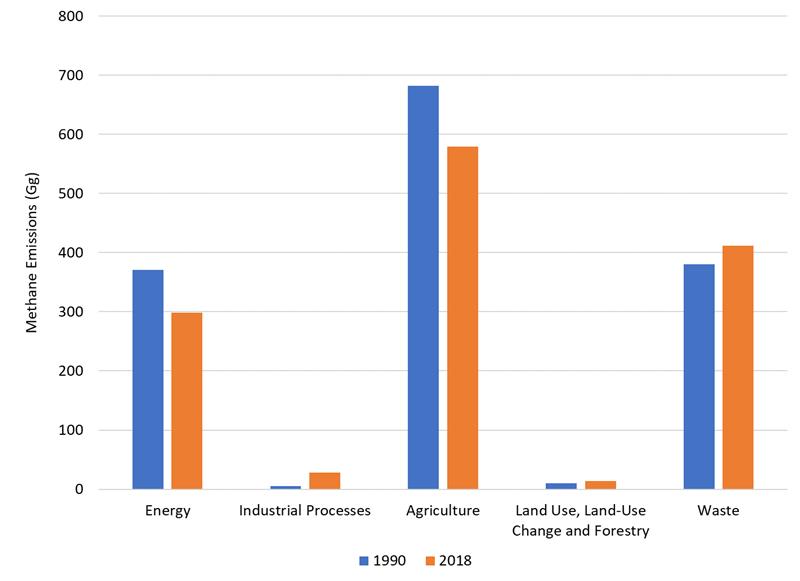Introduction
The Republic of Korea joined the Global Methane Initiative (GMI) in 2005 and serves on the Oil & Gas Subcommittee.
The Republic of Korea has made significant progress in reducing methane emissions as part of the country’s comprehensive climate strategies. By improving practices in agriculture, waste methane recovery, and the energy sector, the country has committed to lowering methane output. In recent years, the Republic of Korea has actively promoted the use of biogas to support the country’s clean energy transition, with the goal to reduce methane emissions by 30% by 2030. These efforts, along with participation in international initiatives, demonstrate the Republic of Korea’s commitment to addressing methane emissions and aligning its strategies with global climate goals.
The Republic of Korea is currently active on the Oil & Gas Subcommittee.
- Introduction
- Methane Emissions Summary
- Methane Commitments and Plans
- Methane Actions
- Ministries and Agencies Supporting Methane Actions
- GMI Delegates
Last Updated: October 2024
Methane Emissions Summary
According to the Fourth Biennial Report of the Republic of Korea, submitted in 2021, methane accounted for 3.8% of greenhouse gas (GHG) emissions in 2018, amounting to 27.7 million tons CO2 equivalent. Methane emissions have been reduced in the energy and agriculture sectors since 1990.
Total Methane Emissions and Percentage of Total Greenhouse Gas Emissions, 2010–2018, excluding LULUCF (million tCO2 equivalent)
|
Year |
Methane Emissions (million tons CO2 equivalent) |
Percentage of All Greenhouse Gas Emissions |
|
2018 |
27.7 |
3.8% |
|
2017 |
27.4 |
3.9% |
|
2016 |
27.0 |
3.9% |
|
2015 |
26.9 |
3.9% |
|
2014 |
27.1 |
3.9% |
|
2010 |
27.6 |
4.2% |
Change in Methane Emissions by Sector, 1990 and 2018

Source: The Fourth Biennial Report of the Republic of Korea, 2021. https://www.gir.go.kr/eng/board/read.do?pagerOffset=0&maxPageItems=10&maxIndexPages=10&searchKey=&searchValue=&menuId=31&boardId=7&boardMasterId=21&boardCategoryId=
Methane Commitments and Plans
Methane mitigation efforts in the Republic of Korea are guided by national and international commitments and plans.
National
- The National Plan for Carbon Neutrality and Green Growth, released in 2023, includes methane mitigation initiatives in the agriculture sector by implementing sustainable agricultural practices and developing low-methane feed.
- The Republic of Korea’s Nationally Determined Contributions (NDC), published in June 2022, establishes the goal of reducing methane emissions by recovering methane emitted from landfills and promoting sustainable farming and livestock practices to mitigate methane emissions.
International
- The Republic of Korea joined the Global Methane Pledge (GMP) in 2021 at the United Nations (UN) Climate Change Conference (COP26), agreeing to take voluntary actions to contribute to reduce global methane emissions by 30% from 2020 levels by 2030.
- The Republic of Korea signed the Paris Agreement on climate change in April 2016, committing to significant measures to combat methane emissions. Specifically, the country’s NDC aims to achieve a 30% reduction in methane emissions by 2030.
- The Republic of Korea has been a partner of the Climate and Clean Air Coalition since 2013, supporting activities to reduce methane and other short-lived climate pollutants.
Methane Actions
The following highlights a sampling of actions taken by the Republic of Korea to address methane, organized by GMI sector.
Biogas Sector
- The dung beetle, once native to the entire Korean Peninsula, was believed extinct in the 1960s and 1970s due to pesticides and anthelmintics. In 2019, the Republic of Korea began efforts to reintroduce a species of dung beetles from Mongolia. These beetles help reduce methane emissions by breaking down cattle manure and shifting decomposition from methane-producing anaerobic conditions to oxygen-rich, aerobic ones. (September 2023)
- In 2022, the Republic of Korea announced plans to expand biogas generation to achieve the larger goal of doubling renewable energy. These plans include increasing biogas plants from 110 to 140 facilities, resulting in approximately a 40% increase in biogas production. (June 2022)
- The Republic of Korea harnesses biogas generated from food wastewater to power city buses. Each day, 800 tons of food wastewater is processed into biogas, helping to reduce methane emissions and support sustainable energy initiatives. (June 2011)
Ministries and Agencies Supporting Methane Actions
Explore the following websites to learn more about the government ministries addressing methane emissions.
GMI Delegates
| Committee/Subcommittee | Delegate Name | Affiliation |
|---|---|---|
| Oil & Gas Subcommittee | Lee Hoh Yeon | Republic of Korea Ministry of Trade, Industry & Energy (MOTIE) |
| Oil & Gas Subcommittee | Yong-hwan Lee | Ministry of Knowledge Economy |

 Mexico
Mexico